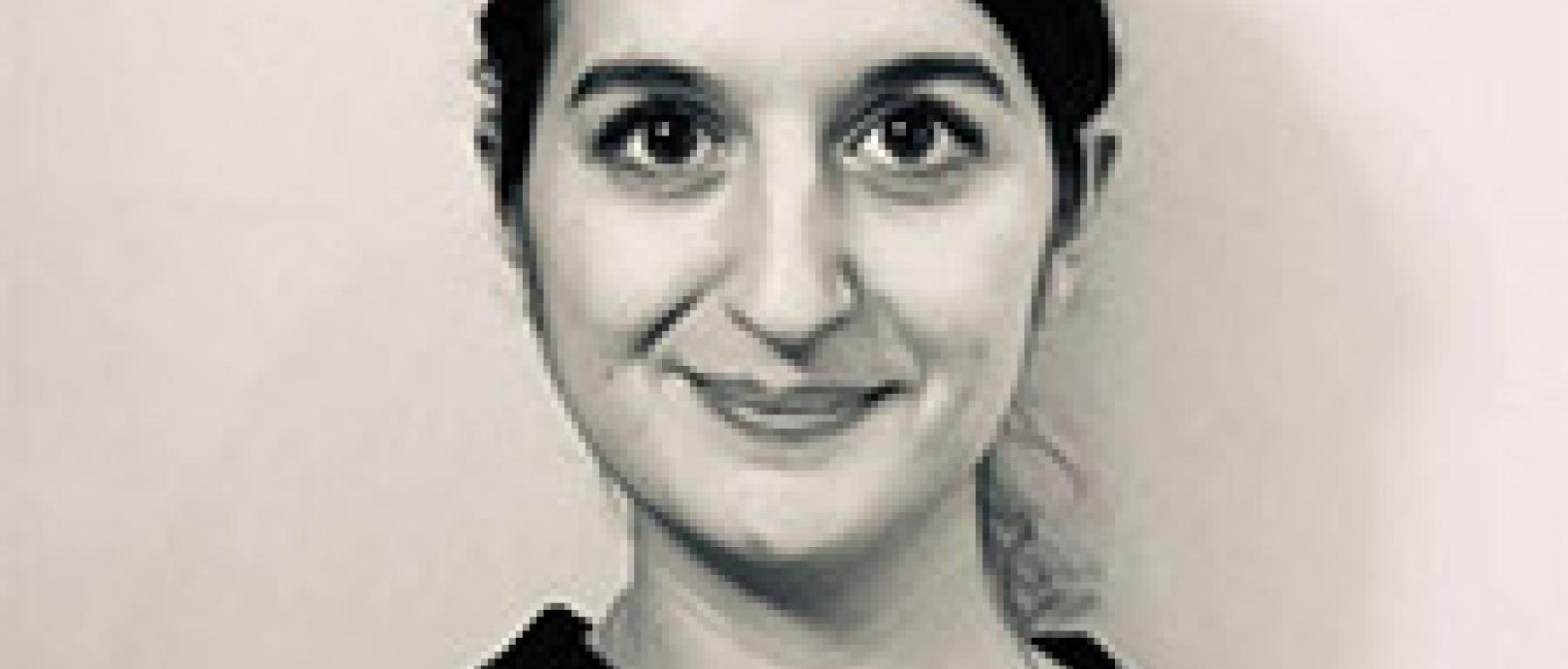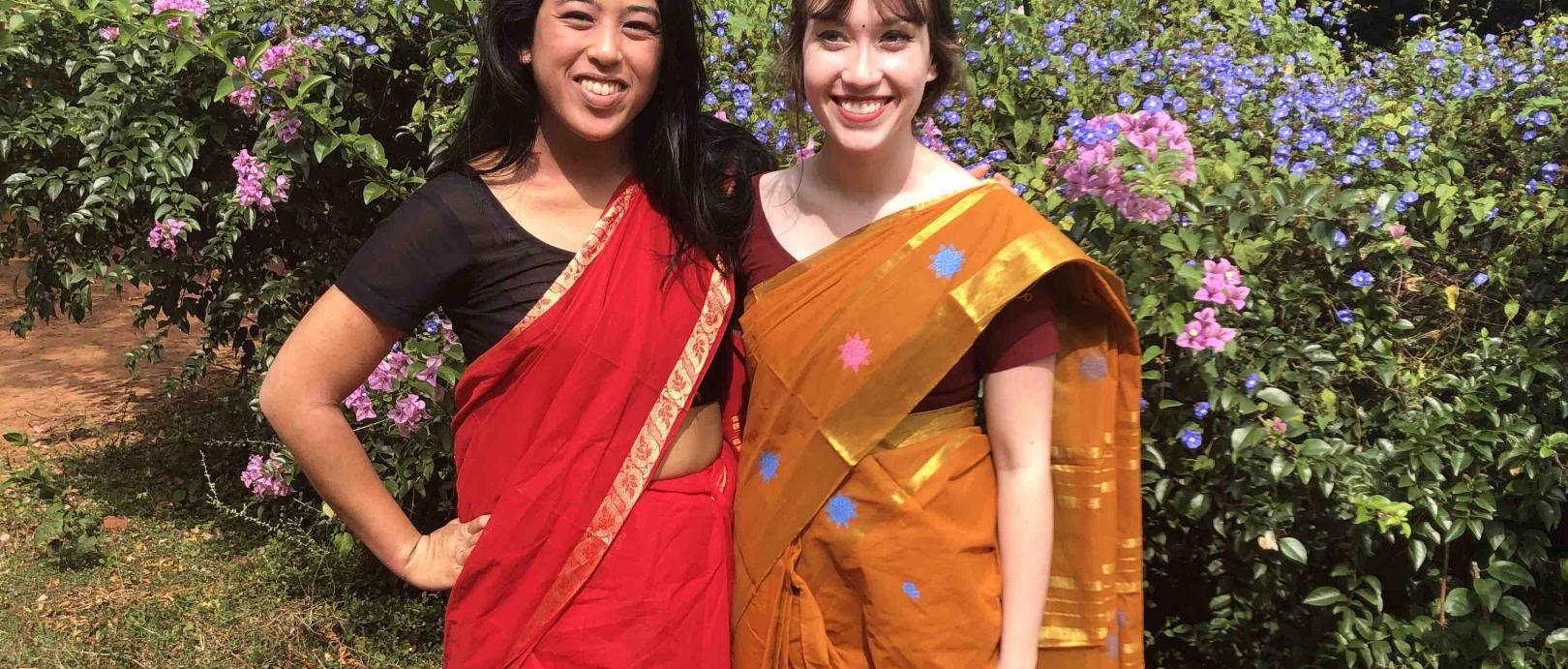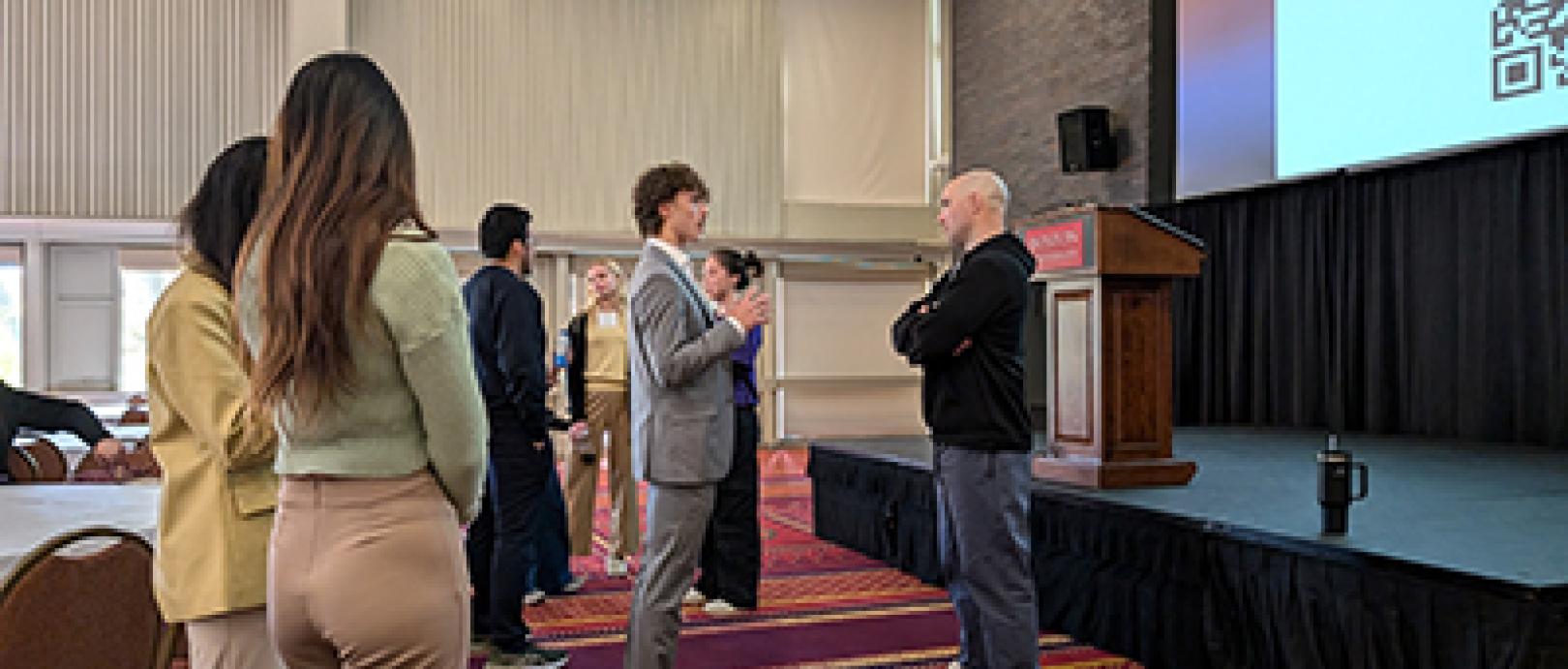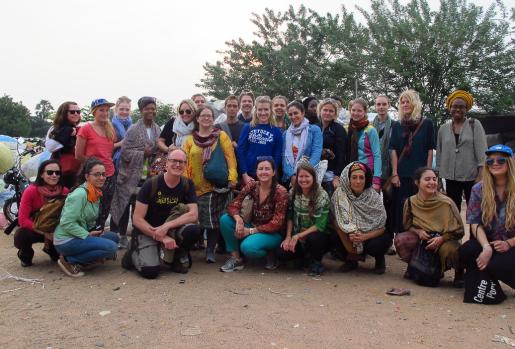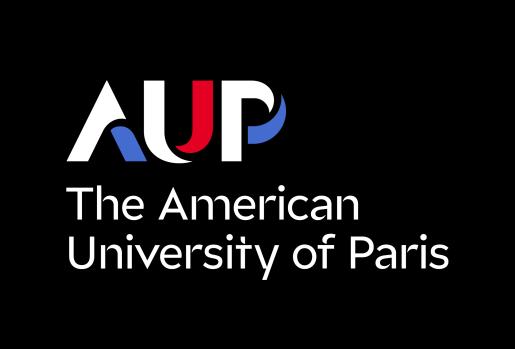MA in Global Communications
The MA in Global Communications is an interdisciplinary academic program with a hybrid emphasis on theory and practice that trains emerging professionals to navigate and excel in today’s complex global communications landscape.

The RNCP-accredited MAGC (pronounced “magic”) program combines theoretical coursework with practice-based experience through study trips and internships, meaning students gain foundational experiences in a wide range of international communications roles. We understand “global” to mean cross-cultural and border-spanning, and our courses acknowledge that perspectives on these subjects can vary massively across the world. To thrive in international careers, students need to be able to analyze and engage with new perspectives in a way that is respectful, open-minded and critical. Classes are complemented with study trips that take students across the world to places such as Fez, Morocco, or Auroville, India, to interact with local professionals and decision-makers in contexts that put their theoretical knowledge and practical skills into action.
The program aims to give students an in depth understanding of how communications industries worldwide interact and intersect, from brand building and marketing to journalism and media production. It prepares students to operate strategically within these professional fields to maximize the impact of communications. Students may choose a general track, or choose the subjects they wish to go deeper into, selecting from a number of tailored tracks in 1) Fashion, 2) Digital Culture or 3) Development Communications. They may also tailor their educational experience in this master’s by adding electives in topics such as gender, cross-cultural representation and advocacy. No matter their focus, students learn to analyze, confront, debate and manage the complex ethical issues that define current-day communications at the global scale. This prepares them to take on cross-border careers, as entrepreneurs, or working for multinational companies, NGOs, international organizations or civil society actors.
In addition, the program features a variety of pre-professional modules that allow students to learn directly from professionals, who provide them with practical skills and greater insight into what it takes to succeed in international careers.
Master of Arts in Global Communications (3 tracks available)
- Duration 3-4 Semesters
- Entry time Fall or Spring
- Tuition and Fees €51,744
- Language English
-
Overview
The core curriculum of the MA in Global Communications provides a broad, flexible overview of contemporary media and communication. It is regularly updated to reflect emerging communications trends around the world, ensuring students develop a relevant toolkit of critical and practical skills adapted to the varied and fast-moving landscape of global communications. These core competencies include qualitative and quantitative analysis, written and spoken communication skills, and mediated communications including video, print, social media, and visual modes of production. The in-class learning experience is enriched with immersive study trips, bringing students into contact with experts in the field.
Topics covered include:
- Communications theory: The major concepts and debates in the field, from its development through to the latest challenges of communicating in a globalized world.
- Social change: Exploring the function of communication as a tool in social transformation.
- Digital media technologies: Looking at the ways in which the internet, social media and smartphones, among other technologies, will continue to impact contemporary communications.
- Global media systems: Looking at structure, ownership, control, influence and innovation in knowledge production.
- Visual culture: Exploring the practice of looking and the power of images and screens.
- Creative industries: Analyzing their increasing role in advertising, branding, and promoting and disrupting ideas and values.
- Journalism and public relations: Including the challenges and opportunities of producing and sharing content in an attention-based digital economy.
- Fashion and material culture: Understanding the rapidly transforming fashion industry and the wide-ranging practices of consumption in consumerist societies.
- Cultural difference and diversity: Exploring the complex relationship between these concepts and the practice and politics of communications worldwide.
- Activism and advocacy: Understanding advocacy in a world with new political stakes and transformed by new technology.
Tracks
The MA in Global Communications provides a broad, contextalized foundation in communications theory and practice. However, students may choose to specialize in one of four available tracks. Focusing respectively on either, a general understanding of the field, fashion, digital culture or development communications, these tracks encourage students to tailor their understanding with case studies relevant to the field or industry that most matches their interests, experience and career goals.

The core program of the MA in Global Communications, the courses take advantage of the extraordinary breadth of faculty knowledge and expertise, in a curriculum always being adapted to meet emerging needs. Browse this page to learn more about what you'll learn or click the links below to explore the specialized tracks available.

The Fashion Track of the MA in Global Communications allows students to apply learned theory to the global cultural phenomenon and vast professional industry that is fashion. The track takes advantage of AUP’s privileged position in Paris to provide on-location opportunities in various industry settings. Graduates gain a deep understanding of fashion’s sociocultural elements and critical, creative and transferable skills that help them succeed in a wide range of communications fields and the fashion industry specifically.

The program’s Development Communications Track explores how communication is creatively used to initiate social change. Well-crafted communications strategies are central to the positioning of international organizations, NGOs and national governments, especially when seeking to find solutions to global problems that require intercultural and ethical commitment. For a future professional in the field, it is essential to have a well-grounded theoretical understanding of communication for social change and be proficient in the technical skills that are essential to practitioners. Students learn to think critically about interactions between states, private businesses and third-sector actors.

The Digital Cultures and Industries Track of the MA in Global Communications offers an innovative, interdisciplinary focus on the central importance of digital technologies in today’s world. How we communicate today is in flux, from new conceptions of identity and community to reconfiguring global networks and virtual spaces. Students will acquire in-depth knowledge of the theories, contexts and practices of digital media, and will reflect upon their own relationship to global cultures and communications industries.
Learning Objectives
The program prepares students to be culturally fluent, adaptable communications professionals by focusing on the following key learning outcomes:
- Understand and be able to use qualitative and/or quantitative communications research methodologies
- Be aware of key issues in debates about globalization and their relationship to forms of global media and culture
- Develop critical perspectives on major concepts and theories in media studies, communications, cultural studies
- Develop practical competence in a field of contemporary communications
Students on the MA in Global Communications will:
- challenge assumptions and weigh opposing perspectives to build compelling arguments on complex emerging topics;
- develop independent research skills in close consultation with faculty to deepen their understanding of these topics;
- master practical skills in a wide range of communications techniques and technologies;
- gain professional experience through meeting with industry leaders from a wide range of organizations;
- be immersed in professional environments through experiential learning opportunities in the field, the studio and intensive workshops;
- explore global and cross-cultural perspectives as technology both enhances and fragments human interaction;
- understand the importance of historical communications contexts to contemporary challenges; and
- benefit from intellectual and professional mentorship and personalized attention through an intimate classroom environment and faculty-student collaboration.
Five years out from graduation, Faith Toran’s career has already taken her all over the world.

Structure
Program Requirements (48 credits)
The MA in Global Communications is a 48-credit program. All courses listed below are 4-credit courses unless otherwise noted.
Please note that all requirements from previous years can be found in our archive catalogs.
Fall Spring Summer Fall 2 2 core courses 2 core courses 2 elective courses Internship/Thesis* 2 elective courses 2 elective courses Internship/Thesis Seminar (2 credits) 16 credits 18 credits 8 credits 6 credits *The length of the internship or thesis may vary, however — many students choose to take additional time for these components.
Spring Summer Fall Spring 2 2 core courses 2 elective courses 2 core courses Internship/Thesis* 2 elective courses 2 elective courses Internship/Thesis Seminar (2 credits) 16 credits 8 credits 18 credits 6 credits *The length of the internship or thesis may vary, however — many students choose to take additional time for these components.
Important note: Students can choose this option upon approval from their academic advisor.
1st Semester 2nd Semester 3rd Semester 2 core courses 2 core courses 2 elective courses 2 elective courses 2 elective courses Internship/Thesis* Internship/Thesis Seminar (2 credits) 16 credits 18 credits 14 credits *The length of the internship or thesis may vary, however — many students choose to take additional time for these components.
Featured Courses
The program draws on interdisciplinary teaching methods, combining lectures, seminar discussions, case studies and student-directed projects with experiencing learning options out in the field. We place special emphasis on the development of professional skills and help students reflect on available career pathways by placing learned theory in context. Students also regularly have the opportunity to collaborate with each other and with faculty on research projects, conferences and specialized directed studies.
Perspectives on Digital MediaThe Digital Cultures and Industries Track of the MA in Global Communications program at AUP takes a hybrid approach to examining something students are often already immersed in: digital media.

Iceland
Place BrandingThe Cultural Program study trip to Reykjavik and other destinations across Iceland allows you to explore and understand how place promoters in the country have used place branding to develop a compelling national story.

Auroville, India
Sustainable DevelopmentThe Sustainable Development Practicum is a unique, intensive field course, combining site visits and opportunities to pursue internship or volunteer experiences with non-governmental organizations.

Required GPA
Graduate students must maintain a cumulative grade point average (GPA) of 3.00. Students with a GPA of less than 3.00 will be placed on probation. Only two grades of C (or C+) may be counted towards an MA degree. Students do not earn credit for grades below C.
Graduation
Graduates of the program join the University’s annual Commencement Ceremony in the beautiful Théâtre du Châtelet.

-
Experiential Learning
To understand how communications operate globally, students need to apply learned theory to a vast array of cultural and practical contexts – that’s what makes graduate study trips such a vital part of the MA in Global Communications program. Learning to translate concepts across cultures is made possible through immersion in cross-cultural environments: whether that’s through studying place branding in Iceland, exploring cultural heritage in Morocco or practicing development communications in India.
The other key aspect of study trips for the graduate is professional networking opportunities. In each location students visit, industry experts who are working to implement media projects that speak across languages and borders, give voice to those who have been historically silenced, or construct, communicate and preserve cultural heritage. By interacting with key professionals in this way, students develop a sense of the breadth of career pathways available to them.

Sustainable Development Practicum
Students travel to India to study how communication works when local government bodies, civil-society actors and NGOs create sustainable development initiatives.
#182757
Morocco Study Trip
This five-day Fall-semester trip immerses students in the rapidly changing cultural and communications environment of Morocco.
#446CCF -
Faculty
Students in the MA in Global Communications benefit from close interaction with expert faculty whose twin focuses of teaching and research encourage extraordinary intellectual collaboration both in and out of the classroom. Students regularly form close bonds with their professors, who act as mentors and advisors as well as teachers. Research collaborations between graduate students and faculty members are common: some recent examples include a research project on prison education working with formerly incarcerated activists and a virtual exhibition on the future of fashion post-pandemic.
Faculty in the Department of Communication, Media and Culture come from a wide variety of professional backgrounds, from those who have decades of experience in brand consultancy to active journalists reporting across the world. Many have lived and worked in multiple countries and speak two or more languages, bringing rich, diverse perspectives from their international experience with them into their teaching. Their professional networks allow them both to bring experts into the classroom and to take students to study communications theory on site in destinations such as Iceland, Morocco and India.
Our professors' interdisciplinary academic specialisms overlap with diverse fields including history, politics, art, semiotics, psychology, film and food studies. Their academic output translates into a body of peer-reviewed articles, books, media engagements and conference appearances every year. Specific recent publications include works exploring queer theory and media studies, post-truth politics, and sustainable fashion education.
 Lacy AudryJunior Lecturer
Lacy AudryJunior Lecturer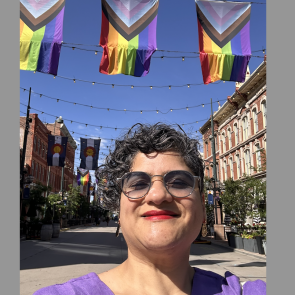 Fatima AzizAssistant Professor, Graduate Program Director MA in Global Communications (MAGC)
Fatima AzizAssistant Professor, Graduate Program Director MA in Global Communications (MAGC) Michael BehnkeAssistant Professor
Michael BehnkeAssistant Professor Dawn BookerJunior Lecturer
Dawn BookerJunior Lecturer Waddick DoyleProfessor, Program Director, MSc in Strategic Brand Management
Waddick DoyleProfessor, Program Director, MSc in Strategic Brand Management Tanya ElderAssistant Professor, MA in Global Communications
Tanya ElderAssistant Professor, MA in Global Communications Wickie Meier-EngströmLecturer
Wickie Meier-EngströmLecturer Matthew FraserProfessor
Matthew FraserProfessor Aurelien GohierJunior Lecturer
Aurelien GohierJunior Lecturer Jayson HarsinProfessor
Jayson HarsinProfessor Jurgen HeckerInstructor, Program Coordinator for Journalism
Jurgen HeckerInstructor, Program Coordinator for Journalism Jon HenleyLecturer
Jon HenleyLecturer Sophie KurkdjianAssistant Professor
Sophie KurkdjianAssistant Professor Nina LamparskiLecturer
Nina LamparskiLecturer Andre LavergneSenior Lecturer
Andre LavergneSenior Lecturer Joseph LukawskiLecturer
Joseph LukawskiLecturer Sarah McginnisLecturer
Sarah McginnisLecturer Saint-clair Milesi
Saint-clair Milesi Noemie OxleyAssistant Professor
Noemie OxleyAssistant Professor Robert PayneProfessor, Department Chair – Communication, Media and Culture
Robert PayneProfessor, Department Chair – Communication, Media and Culture Bryan PirolliLecturer
Bryan PirolliLecturer Cecile PoignantLecturer
Cecile PoignantLecturer Renate StaussAssociate Professor, Program Coordinator for Fashion Studies
Renate StaussAssociate Professor, Program Coordinator for Fashion Studies Charles TalcottAssociate Professor
Charles TalcottAssociate Professor Willem Van Der HorstLecturer
Willem Van Der HorstLecturer Tobey WardJunior Lecturer
Tobey WardJunior Lecturer -
Careers
Graduates from the MA in Global Communications go on to meaningful careers in an array of fields. The interdisciplinary, hybrid academic nature of the program produces expert communications professionals and scholars, who are well equipped to engage with and lead in the rapidly evolving landscape of communication. Graduates have gone on to work in some of the world’s most prominent companies and organizations, including Google, TIME Magazine and the OECD. Others go on to PhD programs in communications fields.

Joel Mandina G’12
New Orleans-based PR executive whose global firm VICE blends storytelling &culture
#811D1CGraduate Career Outcomes
The program’s combination of rigorous academic training and hands-on practice through study trips and research projects provides a valuable skill set that greatly improves students’ employability. Students having completed the degree are well prepared to pursue careers with a wide range of employers, including NGOs, international organizations, startups and multinationals. As reflected in the global reach of our graduate community, alumni of the program are working as brand managers, communicators, journalists and researchers in over 30 countries worldwide, from Australia to India and from South Africa to Brazil.
Our community of over 20,000 graduate and undergraduate alumni continue to offer opportunities to connect and expand horizons no matter where students find themselves after graduation. Across all of AUP’s graduate programs, nine out of ten graduate alumni go on to work or further study within a year of graduation, and more than eight out of ten report an international element to their careers. Other graduates have gone on to enroll in PhD programs at internationally renowned universities, including Yale University, Paris-V, and the London School of Economics.
Internships
Students in the MA in Global Communications are encouraged to build on their education and kick-start their career by conducting an internship, allowing them to apply learned theory and skills in professional contexts. Though paid internships are rare as part of the program, our internships database does provide access to top-level employers at Paris-based international organizations, businesses and media outlets.
Career Support ServicesAUP’s Center for Academic, Career and Experiential Advising (ACE) supports graduate students in defining, planning and developing their career pathway both during their degree and following graduation.

-
Admissions
AUP’s graduate programs welcome applications from motivated, high-caliber individuals who feel they will thrive in AUP’s international and dynamic environment. When assessing applications, we take a holistic approach to identifying the next cohort of Graduate Global Explorers, considering education, experience and general fit with AUP values and curriculum. Students can pursue our innovative program in Paris on the MA in Global Communications in either Fall or Spring.
The MA in Global Communications welcomes applicants from a variety of backgrounds. These include recent graduates in communications fields (e.g. Communications, Media, Journalism) or those from other disciplines with a proven interest in communications. We also welcome applications from professionals in related fields looking to expand their knowledge and from those who are looking to change direction in their careers.
Global Communications is an interdisciplinary, hybrid academic program that produces expert communications professionals and scholars. Taught by a dedicated, inspirational and international faculty made up of intellectual and professional leaders in their fields, the program is designed for you to find a pathway to future success that suits your own needs.
Students will become culturally savvy problem-solvers, communicators and innovators ready to take their skills from the classroom to the fields they chose to integrate and to use their education to make a difference.
If you are passionate about communications and that global itch is calling you, we encourage you to enquire into the specifics of our program and to apply!
Tuition and Scholarships
Depending on the length of your graduate program, the cost will vary. Find out more about tuition and costs for the MA in Global Communications.
AUP offers need- and merit-based scholarships to graduate students. The majority of our financial awards range from 25 percent to 50 percent of tuition and the average award amounts to about 30 percent.
Application Process
Our application process is simple and straightforward: students submit their information, send us their supporting documents, and receive their admission decision within three weeks.
- TOEFL - Internet Based Test (ibT) minimum score: 101. To have your results sent directly to The American University of Paris, use our institutional code 0866.
- Cambridge English - Advanced, or Proficiency level, minimum score: 185.
- TOEIC - Listening and Reading, minimum score 910. To have your results sent directly to The American University of Paris, use our institutional code 0866.
- IELTS - Academic Option, minimum score 7.0.
- Duolingo English Test: The test must include sub-scores for the 4 component elements. Minimum score required: 130.
- You have been living in Australia, Canada, Ireland, New Zealand, South Africa, the United Kingdom or the United States for at least two consecutive years and have recently studied in an all-English curriculum.
- You have studied for at least four years in an all-English curriculum in any other country, although we continue to reserve the right to request English test results from any applicant.
You can start your application process by creating an account on AUP’s Application Portal. You will be able to return to this page to finish and review your application prior to submission as often as you like.
Online Form
Each graduate program has its own application via the AUP Application Portal. You may only apply to one program.
The form will ask you to complete various details including contact details, background information and educational history. Your application will also require several supporting documents which can be uploaded directly in your online application in .pdf or .doc formats.
Transcripts
We require official transcripts covering all previous university coursework, including confirmation of an awarded bachelor’s degree or equivalent. All official documents must be submitted in English or French, or with a certified translation into one of these two languages. We recommend your transcripts demonstrate a minimum 3.0 cumulative grade point average (or equivalent).
Personal Statement
Applicants are required to submit a 500-word personal statement describing their reasons for applying to the program of their choice, drawing on relevant past undergraduate research or professional experience, as well as your career objectives.
Program Specific Items
Standardized tests, such as the GRE, GMAT, or LSAT are required for admission to some of the graduate programs at The American University of Paris and are listed below. Exemptions from this requirement are given to students from non-American universities and institutions, applicants with an M.A. degree, and mid-career applicants with a minimum of five years of professional experience following graduation.
CV / Resume
Applicants should submit a C.V. or resumé including university and/or employment history; community involvement; professional, and/or university extracurricular activities; and recognitions and achievements.
Letters of Recommendation
We require two letters of recommendation from individuals well-qualified to provide us with first-hand knowledge about your potential for graduate study, with at least one letter from a university professor if you graduated in the last five years.
Veteran & Military Applicants: One of your letters of recommendation should ideally come from a Commanding Officer.
When you have entered the contact details for your recommenders to your application, AUP will approach them for their recommendation.
English
Students must demonstrate sufficient fluency in English. If English is not your first language, we require you to submit results less than two years old from one of the following tests:
The English language test requirement is waived if you meet one of the following criteria:
We reserve the right to request English test results from any applicant.
When you have completed your application, you will be asked to review the application and confirm that you are satisfied with the application before final submission. There is a non-refundable €75 processing fee to be paid at this point.
When AUP has received all of the documents (including responses from your recommenders), the Admissions Committee will review your application. In some cases the committee may come back to you for additional information. A review takes approximately four weeks from when the final documents are received.
When the Admissions Committee has reached its decision, an email will be sent to the address provided asking you to log-on to the Application Portal to view the decision.
Deadlines
We review completed applications in rounds throughout the year. We encourage you to apply early: priority for admission and financial aid is given to those who apply in the earlier rounds.
Fall Admission
Review Rounds Application Round Deadline Priority Admission by February 1st Regular Admission by March 31st Late or International Regular admission after April 1st (based on available spaces) Spring Admission
Review Rounds Application Round Deadline Priority Admission by September 15th Regular Admission after September 15th (based on available spaces) -
RNCP Certification

What is RNCP Certification?
The Répertoire National des Certifications Professionelles, also known as RNCP, is the French national register of professional qualifications. It is the central reference framework for all diplomas, qualifications and titles recognized by the French state. This professional certification allows the holder to demonstrate competency of the skills and knowledge necessary to exercise an activity corresponding to a particular professional field. It guarantees that the holder is qualified to begin work in that field immediately, and it is recognized EU-wide.
RNCP and MAGC
The MA in Global Communications has held RNCP certification since December 2017. This means that graduates of the program, no matter which track they study, will be awarded two certifications upon successfully completing the program:
- The American University of Paris master's diploma, certifying the successful completion of the program’s degree requirements, including its 48 credits.
- The RNCP-recognized degree qualification “Manager de la Communication et de Marketing International” (Director of International Communications/Marketing).

What This Means for Finding Work in France
As part of RNCP certification, all MA in Global Communications students who graduated on or after May 21, 2013, are eligible to apply for France’s Carte de séjour - Recherche d’emploi/création d’entreprise. This one-year visa extension grants students the opportunity to live and work in France while looking for a job or setting up a business, within certain guidelines laid out in the visa description.
Access to this visa through RNCP certification is currently only available to graduates of the program and the MSc in Strategic Brand Management, as AUP’s other master’s programs have not yet been certified in this way. Graduates will be able to apply for this visa extension once they have completed their studies and before their student visa expires.
For more information about the process of applying for this visa, please contact AUP Graduate Programs at graduateprograms@aup.edu.
-
Requirements: MA in Global Communications (48 Credits)
Requirements and credit counts differ for the various Master’s programs at AUP. Please note that all requirements from previous years can be found in our archive catalogs.
Graduate students must maintain a cumulative grade point average (GPA) of 3.00. Students with a GPA of less than 3.00 will be placed on probation. Only two grades of C (or C+) may be counted towards an M.A. degree. Students do not earn credit for grades below C.
Track Requirements
Read about requirements for the Digital Cultures & Industries Track
Read about requirements for the Development Communications Track
Read about requirements for the Fashion Track
All courses carry four (4) credits unless otherwise noted.
Core Courses (16 Credits)
Course Code Course Name CM5001 Global Communications Select three courses from the following list:
Course Code Course Name CM5002 Brands and Belief CM5004 Global Digital Cultures CM5005 Identity Formation in a Transnational World CM5025
PO5025Communications & the Global Public Sphere CM5026
PO5026Politics & Economics of Global Media CM5060 Visual Culture, Theory & Communication CM5097 Global Communications Research Seminar Electives (24 Credits)
Course Code Course Name Elective 1 Any graduate-level CM course. Two modules may be taken to replace a course. Elective 2 Elective 3 Elective 4 Elective 5 Elective 6 Internship, Thesis, or Applied Project (6 Credits)
Capstone options are a thesis or an internship or an applied project.
Course Code Course Name or
or
Thesis
or
Applied Project Capstone
or
Internship
Plus (2 Credits)
Course Code Course Name or
Global Workplace Cultures: Internship Seminar
or
Thesis Seminar
- Overview
- Experiential Learning
- Faculty
- Careers
- Admissions
- RNCP Certification
- Requirements

